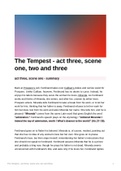The Tempest - act three, scene
one, two and three
act three, scene one - summary
Back at Prospero’s cell, Ferdinand takes over Caliban’s duties and carries wood for
Prospero. Unlike Caliban, however, Ferdinand has no desire to curse. Instead, he
enjoys his labors because they serve the woman he loves, Miranda. As Ferdinand
works and thinks of Miranda, she enters, and after her, unseen by either lover,
Prospero enters. Miranda tells Ferdinand to take a break from his work, or to let her
work for him, thinking that her father is away. Ferdinand refuses to let her work for
him but does rest from his work and asks Miranda her name. She tells him, and he is
pleased: “Miranda” comes from the same Latin word that gives English the word
“admiration.” Ferdinand’s speech plays on the etymology: “Admired Miranda! /
Indeed the top of admiration, worth / What’s dearest to the world!” (III.i.37–39).
Ferdinand goes on to flatter his beloved. Miranda is, of course, modest, pointing out
that she has no idea of any woman’s face but her own. She goes on to praise
Ferdinand’s face, but then stops herself, remembering her father’s instructions that
she should not speak to Ferdinand. Ferdinand assures Miranda that he is a prince
and probably a king now, though he prays his father is not dead. Miranda seems
unconcerned with Ferdinand’s title, and asks only if he loves her. Ferdinand replies
The Tempest - act three, scene one, two and three 1
, enthusiastically that he does, and his response emboldens Miranda to propose
marriage. Ferdinand accepts and the two leave each other.
Prospero comes forth, subdued in his happiness, for he has known that this would
happen. He then hastens to his book of magic in order to prepare for his remaining
business. Ferdinand goes on to flatter his beloved. Miranda is, of course, modest,
pointing out that she has no idea of any woman’s face but her own. She goes on to
praise Ferdinand’s face, but then stops herself, remembering her father’s
instructions that she should not speak to Ferdinand. Ferdinand assures Miranda that
he is a prince and probably a king now, though he prays his father is not dead.
Miranda seems unconcerned with Ferdinand’s title, and asks only if he loves her.
Ferdinand replies enthusiastically that he does, and his response emboldens
Miranda to propose marriage. Ferdinand accepts and the two leave each other.
Prospero comes forth, subdued in his happiness, for he has known that this would
happen. He then hastens to his book of magic in order to prepare for his remaining
business.
act three, scene one - analysis
This scene revolves around different images of servitude. Ferdinand is literally in
service to Prospero, but in order to make his labor more pleasant, he sees Miranda
as his taskmaster. When he talks to Miranda, Ferdinand brings up a different kind of
servitude—the love he has felt for a number of other beautiful women. Ferdinand
sees this love, in comparison to his love for Miranda, as an enforced servitude: “Full
many a lady / I have eyed with the best regard, and many a time / Th’ harmony of
their tongues hath into bondage / Brought my too diligent ear” (III.i.39–42). When
Miranda stops the conversation momentarily, remembering her father’s command
against talking to Ferdinand, the prince hastens to assure her that he is worthy of her
love. He is royalty, he says, and in normal life “would no more endure / This wooden
slavery [carrying logs] than to suffer / The flesh-fly blow my mouth” (III.i.61–63).
But this slavery is made tolerable by a different kind of slavery: “The very instant
that I saw you did / My heart fly to your service; there resides, / To make me slave to
it” (III.i.64–66). The words “slavery” and “slave” underscore the parallel as well as the
difference between Ferdinand and Caliban. Prospero repeatedly calls Caliban a
slave, and we see Caliban as a slave both to Prospero and to his own anger.
Ferdinand, on the other hand, is a willing slave to his love, happy in a servitude that
makes him rejoice rather than curse.
The Tempest - act three, scene one, two and three 2




